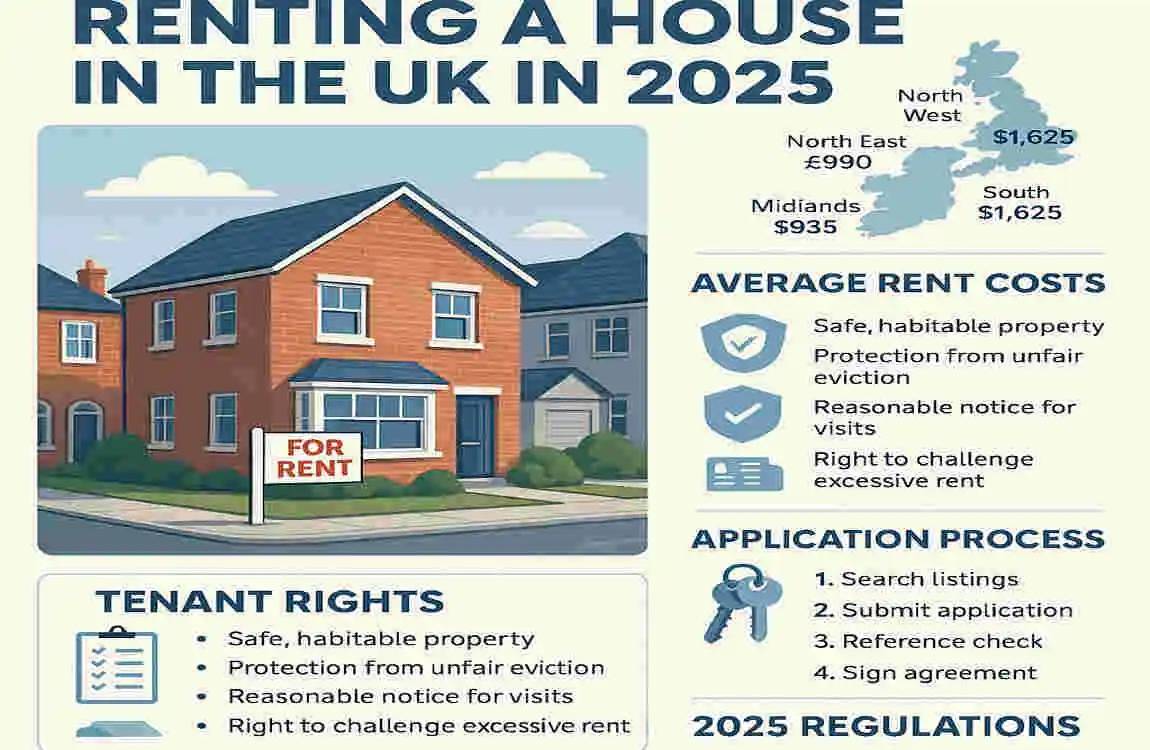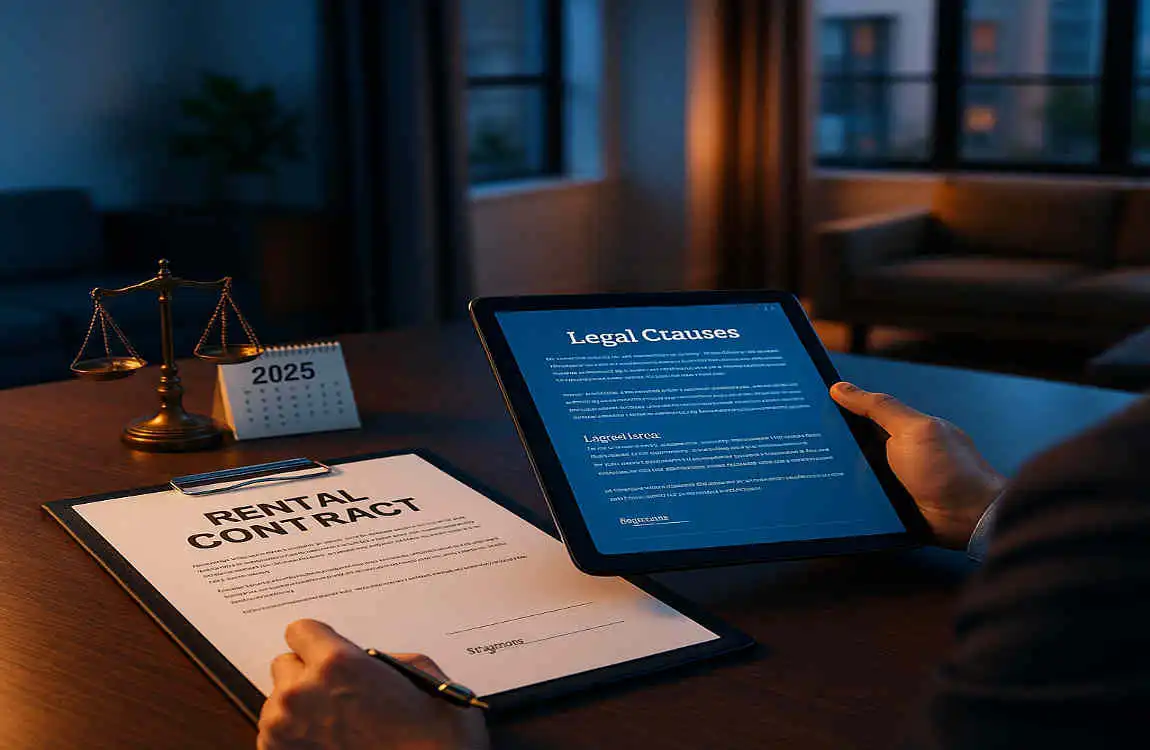To rent a house in the UK in 2025, the timeframe generally depends on several factors, including location, property condition, market conditions, and the effectiveness of the property’s marketing. If priced fairly and in good condition, finding tenants typically takes between one and two months. In competitive markets, it can be quicker, sometimes just a couple of weeks, if the property is vacant and the process moves swiftly. The paperwork and referencing may take a few days to complete, so moving in within 2-3 weeks of finding a property is realistic in many cases.f
For renters, the process involves viewing the property, providing references, paying a deposit, and passing a credit check, all of which affect the overall timeline. Additionally, new laws, such as the Renters’ Rights Bill, expected to come into effect in early 2026, could influence tenancy real estate arrangements; however, the core renting timeline in 2025 remains essentially unchanged.
Overview of Renting a House in the UK in 2025

Current Rental Market Snapshot
The UK rental market in 2025 is characterized by a strong demand for rental properties, particularly in urban areas. The supply of available rentals has been steadily increasing, but it still struggles to keep up with the growing number of renters. This imbalance between supply and demand can impact the time it takes to find and secure a rental property.
Typical Rental Process Steps
The rental process in the UK typically involves several key steps:
- Finding a property: Searching for available rentals through online portals, local agents, and classified ads.
- Viewing properties: Scheduling and attending viewings to assess the condition and suitability of potential rentals.
- Application process: Submitting an application, undergoing reference and credit checks, and paying a deposit.
- Offer acceptance and contract signing: Negotiating the terms of the tenancy and signing the rental agreement.
- Move-in process: Completing any necessary paperwork, conducting an inventory check, and receiving the keys to the property.
Average Timeline Ranges
On average, the entire rental process in the UK can take anywhere from 1 to 2 months. However, this timeline can vary depending on several factors, which we’ll explore in detail in the next section.
Key Factors Affecting the Timeline to Rent a House
Location
The location of the rental property plays a significant role in the time it takes to secure a tenancy. Properties situated near schools, amenities, and public transport tend to be in high demand and may be snapped up quickly. In contrast, rentals in less desirable or remote areas may take longer to find tenants.
Property Condition
The condition of the rental property can also impact the rental timeline. Well-maintained and recently refurbished properties are more likely to attract tenants quickly, while properties requiring significant repairs or upgrades may take longer to rent out.
Pricing Strategy
Setting a fair and competitive rental price is crucial for attracting tenants promptly. Overpriced properties may sit on the market for an extended period, while reasonably priced rentals are more likely to be snapped up quickly.
Market Conditions
The overall state of the rental market can influence the time it takes to rent a house. In areas with high demand and low supply, properties may be rented out within days or weeks. Conversely, in slower markets with an abundance of available rentals, the process may take longer.
Landlord and Agency Responsiveness
The responsiveness of landlords and letting agents can also impact the rental timeline. Efficient and communicative landlords or agents can help streamline the process, while slow or unresponsive parties may cause delays.
Detailed Timeline Breakdown for Renters
Finding a Property
The first step in the rental process is finding a suitable property. This can take anywhere from a few days to several weeks, depending on the location, your specific requirements, and the current market conditions.
To find a property quickly, consider the following strategies:
- Utilize online rental portals: Websites like Rightmove, Zoopla, and OnTheMarket allow you to search for available rentals in your desired area.
- Work with local letting agents: Many landlords use letting agents to manage their properties, so connecting with local agents can help you access a broader range of rentals.
- Be flexible with your criteria: If you’re struggling to find a property that meets all your requirements, consider being more flexible with your search criteria to increase your options.
Viewing Properties
Once you’ve identified potential rentals, the next step is to schedule and attend property viewings. This process can take anywhere from a few days to a couple of weeks, depending on the availability of the landlord or letting agent and your own schedule.
When attending viewings, be sure to:
- Arrive on time: Respect the landlord or agent’s time by arriving promptly for your scheduled viewing.
- Ask questions: Don’t be afraid to ask questions about the property, its condition, and any specific concerns you may have.
- Take notes and photos: Keep track of your impressions and any notable features or issues by taking notes and pictures during the viewing.
Application Process
After finding a property you like, you’ll need to submit an application to the landlord or letting agent. This process typically takes 1-2 weeks and involves several key steps:
- Completing the application form: Fill out the necessary paperwork, providing your personal and financial information.
- Undergoing reference checks: The landlord or agent may contact your previous landlords, employers, or personal references to verify your suitability as a tenant.
- Credit checks: A credit check may be conducted to assess your financial stability and ability to pay rent on time.
- Paying a deposit: You’ll typically be required to pay a deposit, usually equivalent to one month’s rent, to secure the property.
Offer Acceptance and Contract Signing
Once your application has been approved, you’ll need to negotiate the terms of the tenancy and sign the rental agreement. This process can take a few days to a week, depending on the responsiveness of the landlord or agent and any necessary legal formalities.
During this stage, be sure to:
- Carefully review the contract: Read the rental agreement thoroughly and ask any questions or request clarification on any points you don’t understand.
- Negotiate terms if necessary: If there are any aspects of the tenancy you’d like to negotiate, such as the rent or the length of the tenancy, discuss these with the landlord or agent.
- Sign the contract: Once you’re satisfied with the terms, sign the rental agreement to formalize the tenancy.
Move-in Process
The final step in the rental process is moving into the property. This can take anywhere from a few days to a couple of weeks, depending on the notice period required by your current landlord (if applicable) and the time needed to complete any necessary paperwork and inventory checks.
When moving in, be sure to:
- Conduct an inventory check: Carefully document the condition of the property and its contents to avoid any disputes when you move out.
- Set up utilities and services: Arrange for the transfer or setup of essential utilities, including electricity, gas, water, and internet.
- Collect the keys: Once all the paperwork is complete, the landlord or agent will hand over the property’s keys.
Potential Delays and Common Hurdles
While the rental process is generally straightforward, several potential delays and hurdles can impact the timeline:
- Slow paperwork processing: Delays in processing your application or completing necessary paperwork can slow down the rental process.
- Vetting delays: Lengthy reference or credit checks can cause delays in the application process.
- Competition from other tenants: In high-demand areas, you may face competition from other potential tenants, which can impact your ability to secure a property quickly.
- Landlord or agent unresponsiveness: If the landlord or letting agent is slow to respond to your inquiries or requests, this can cause delays throughout the rental process.
Tips to Speed Up the Renting Process
If you’re looking to speed up the rental process, consider the following tips:
Prepare Documents in Advance
Having all your necessary documents ready can help streamline the real estate application process. These may include:
- Proof of income: Recent pay stubs or bank statements to demonstrate your ability to pay rent.
- References: Contact information for previous landlords, employers, or personal references.
- Credit report: A recent credit report to show your financial stability.
Find Properties Faster Using Online Portals and Local Agents
Utilize online rental portals and work with local letting agents to access a broader range of available properties. These resources can help you find rentals more quickly and efficiently.
Negotiation Tips for Faster Approvals
When negotiating the terms of your tenancy, consider the following tips to secure faster approvals:
- Be flexible: If the landlord or agent is hesitant to accept your offer, consider being more flexible with your terms to reach an agreement more quickly.
- Offer a higher deposit: Offering a higher deposit than required can demonstrate your commitment to the property and may help you secure the tenancy more quickly.
- Provide strong references: Providing strong references from previous landlords or employers can help establish trust with the landlord and expedite the approval process.
The Role of Guarantors and Advance Payments
Having a guarantor or making advance payments can help you secure a rental property more quickly. A guarantor is someone who agrees to cover your rent if you’re unable to pay, while advance payments involve paying rent upfront for a specified period.
Using Letting Agents Effectively
Working with a letting agent helps streamline the rental process and speed up the timeline. When using a letting agent, be sure to:
- Communicate clearly: Clearly communicate your requirements and any changes to your search criteria to the agent.
- Be responsive: Respond promptly to any inquiries or requests from the agent to keep the process moving forward.
- Ask for recommendations: Request the agent’s suggestions on properties that may suit your needs and budget.
Understanding Rental Contracts and Legal Aspects in 2025

Minimum Tenancy Lengths and Legal Requirements
In the UK, the minimum tenancy length for an Assured Shorthold Tenancy (AST) is typically six months. However, landlords and tenants can agree to tenancies of longer or shorter duration if both parties consent.
In addition to minimum tenancy lengths, there are several legal requirements that landlords must adhere to when renting out a property. These may include:
- Providing a Gas Safety Certificate: Landlords are required to provide tenants with a valid Gas Safety Certificate annually.
- Ensuring electrical safety: Landlords must ensure that all electrical appliances and wiring in the property are safe and meet current standards.
- Protecting the deposit: Landlords must protect the tenant’s deposit in a government-approved tenancy deposit scheme.
Tenant Rights and Landlord Responsibilities
Understanding your rights as a tenant and your landlord’s responsibilities can help you navigate the rental process more effectively. Some key tenant rights and landlord responsibilities include:
- Right to a safe and habitable home: Tenants have the right to live in a property that is safe, habitable, and free from serious hazards.
- Responsibility for repairs: Landlords are generally responsible for maintaining the property and carrying out necessary repairs.
- Right to privacy: Tenants have the right to enjoy their home without unreasonable interference from the landlord.
Impact of New Regulations or Changes in 2025 Rental Laws
In 2025, new regulations or changes to existing rental laws may be introduced, which could impact the rental process. Staying informed about these changes can help you navigate the rental market more effectively.
Some potential changes to watch out for in 2025 include:
- Changes to tenant fees: The government may introduce new regulations around the fees that landlords and agents can charge tenants.
- Updates to energy efficiency standards: There may be new requirements for landlords to improve the energy efficiency of their rental properties.
- Changes to eviction processes: The government may introduce new rules around the eviction process to provide greater protection for tenants.
Special Cases and Fast-track Options
In some cases, you may need to rent a property more quickly than the average timeline allows. There are several exceptional cases and fast-track options that can help you secure a rental property more quickly:
Renting Through Guaranteed Rent Schemes or Assured Tenancy Schemes
Guaranteed rent schemes and assured tenancy schemes can provide a faster route to securing a rental property. These schemes typically involve a third party, such as a housing association or local authority, guaranteeing the rent payments to the landlord.
Options for Urgent Relocation Needs
If you need to relocate urgently, there are several options you can consider to speed up the rental process:
- Short-term rentals: Consider short-term rental options, such as serviced apartments or short-term lets, which can offer a quicker solution.
- Corporate housing: If you’re relocating for work, your employer may be able to assist with finding corporate housing or temporary accommodation.
- Emergency housing: In cases of extreme urgency, such as domestic abuse or homelessness, you may be eligible for emergency housing through your local authority.
How Renting Timelines Differ in Cities Like London, Manchester, or Rural Areas
Renting timelines can vary significantly depending on the location. In cities like London and Manchester, the high demand for rental properties can result in a faster rental process, with properties being snapped up within days or weeks. In contrast, rural areas may have a slower rental market, with properties taking longer to find tenants.
When renting in a city, consider the following tips to speed up the process:
- Be prepared to act quickly: In high-demand areas, you may need to be ready to view properties and submit applications at short notice.
- Work with multiple agents: Connecting with numerous letting agents can help you access a broader range of properties and increase your chances of finding a rental quickly.
- Be flexible with your criteria: In competitive markets, being more flexible with your search criteria can help you find a property more quickly.
What to Expect Post-Move-In
Once you’ve moved into your new rental property, there are several key steps to take to ensure a smooth transition:
Initial Inspections and Property Condition Reports
After moving in, conduct a thorough inspection of the property and document its condition. This will help you avoid any disputes when you move out. Take photos and videos of the property, and note any existing damage or issues.
Setting Up Utilities and Services
Setting up utilities and services is an integral part of the move-in process. Contact your utility providers to arrange for the transfer or setup of services such as electricity, gas, water, and internet. You may also need to set up council tax and other local services.
Tips for a Smooth Transition to a New Rental Home
To ensure a smooth transition to your new rental home, consider the following tips:
- Update your address with relevant organizations, such as your bank, employer, and healthcare providers.
- Get to know your new area: Take some time to explore your new neighborhood and familiarize yourself with local amenities and services.
- Communicate with your landlord: Maintain open communication with your landlord or letting agent to address any issues or concerns that may arise.




